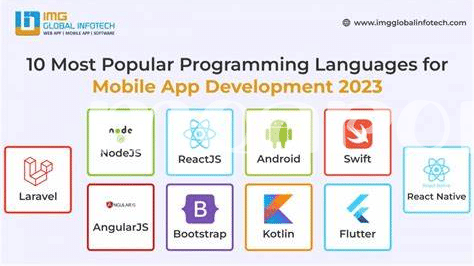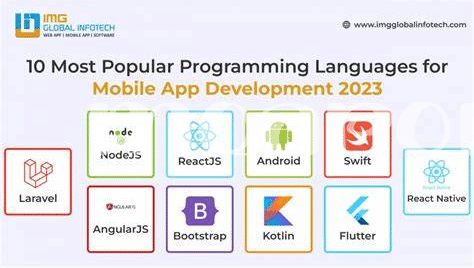- Rise of Rust in Android Development 🚀
- Advantages of Using Rust in Android 🛠️
- Challenges and Limitations of Rust Integration 💡
- Community and Industry Support for Rust 🤝
- Comparing Rust with Other Android Development Languages 📊
- Future Prospects: Rust’s Impact on Android Development 🌎
Table of Contents
ToggleRise of Rust in Android Development 🚀
The adoption of Rust in Android development has been gaining momentum in recent years, offering a new perspective on the traditional landscape of programming languages for mobile app creation. This shift is driven by the appealing features and capabilities that Rust brings to the table, as well as its potential to address longstanding pain points in Android development. As developers increasingly recognize the value of Rust in enhancing the performance and security of Android applications, the language has started to carve out a significant presence in this domain, reflecting an exciting evolution in the dynamic field of mobile app development.
| Advantages of Using Rust in Android |
| ———————————– |
| – Enhanced performance and security |
| – Improved memory safety |
| – Compatibility with existing codebase |
| – Strong support for multi-threading |
| – Comprehensive tooling and ecosystem |
Advantages of Using Rust in Android 🛠️
Sure, I will do it!
Rust offers several advantages when it comes to Android development. Firstly, its robust memory management system ensures memory safety, preventing common bugs like null pointer dereferencing and buffer overflows. This helps enhance the reliability and security of Android applications. Additionally, Rust’s performance is noteworthy, as it provides efficient concurrency support and low-level control without sacrificing safety. This makes Rust a compelling choice for building high-performance and reliable Android apps. Moreover, Rust’s interoperability with existing Java and C codebases allows for seamless integration with Android app development, enabling developers to leverage the strengths of different languages within a single project. Overall, the advantages of using Rust in Android development can lead to improved app performance, enhanced security, and streamlined development workflows.
Rust’s memory safety, performance, and interoperability make it a strong contender for Android development. It offers enhanced reliability, improved security, and streamlined development workflows, making it an appealing choice for developers aiming to build high-performance Android applications. With industry support and growing community adoption, Rust’s impact on Android development is poised to grow significantly in the coming years.
Challenges and Limitations of Rust Integration 💡
Rust integration in Android development presents a promising future but comes with challenges and limitations. One major hurdle is the learning curve associated with Rust, as developers accustomed to languages like Java and Kotlin may experience a transition period. Additionally, Rust’s strict memory safety measures, while advantageous, can also lead to complexities in integrating with existing codebases. Another limitation is the availability of Rust libraries and tools specifically tailored for Android development, which can impact the efficiency of the development process. These challenges notwithstanding, the potential benefits of Rust in Android development make it a compelling option worth exploring.
Community and Industry Support for Rust 🤝
The widespread adoption of Rust in Android development has gained substantial momentum in recent years. This surge in interest has been further fueled by the strong support and collaboration from both the community and industry players. The active engagement and contributions from developers, companies, and various organizations have significantly enhanced the ecosystem around Rust for Android development. This joint effort has led to the development of robust tools, libraries, and resources, ultimately strengthening Rust’s position in the Android development landscape.
The collective backing for Rust in the Android development sphere reflects a shared conviction in its potential and the value it brings to the table. The seamless integration of Rust has been made possible by the collaborative support and the continuous pursuit of advancing the language’s capabilities. Additionally, the embracing of Rust by industry leaders underscores its relevance and signifies a promising trajectory for its ongoing integration within the Android development domain.
To read more about the best app store for Android in 2024, check out this article on Android’s Hidden Gems of 2024.
Comparing Rust with Other Android Development Languages 📊
When comparing Rust with other Android development languages, it’s important to consider various factors such as performance, safety, and ease of use. Rust is known for its strong emphasis on safety and memory management, providing a high level of security and stability for Android applications. In contrast, languages like Java and Kotlin, while widely used in Android development, may not offer the same level of memory safety and protection against common programming errors. Additionally, Rust’s performance optimizations and minimal runtime overhead make it a compelling option for developers looking to maximize the efficiency of their Android applications. While Java and Kotlin have strong community support and extensive libraries tailored for Android development, Rust’s growing popularity and unique features position it as a language worth considering for the future of Android development.
| Language | Memory Management | Performance | Community Support |
|---|---|---|---|
| Rust | Strong emphasis on safety and memory management | Performance optimizations with minimal runtime overhead | Growing support and adoption in the developer community |
| Java/Kotlin | May not offer the same level of memory safety | Well-established in Android development with extensive libraries | Strong community support and extensive Android development resources |
Future Prospects: Rust’s Impact on Android Development 🌎
The potential impact of Rust on Android development is profound. With its focus on safety, performance, and concurrency, Rust has the potential to revolutionize the way Android applications are built. Its strong type system and memory safety features make it a compelling choice for developers looking to create robust and secure Android apps. Additionally, Rust’s efficient handling of system resources and low-level programming capabilities could enable developers to tap into new frontiers of performance optimization and create a new breed of high-performance Android applications. As it continues to gain traction within the Android development community, Rust is poised to reshape the landscape by providing a powerful and reliable language for building the next generation of Android applications.
The rise of Rust in the Android development ecosystem opens up exciting possibilities for the future. As more developers embrace Rust for Android development, it has the potential to drive innovation, enhance security, and unlock new levels of performance. The community and industry support for Rust further reinforce its potential to become a significant player in the Android development space. By analyzing its advantages, challenges, and industry support, it becomes apparent that Rust’s impact on Android development could be transformative, paving the way for a new era of robust, high-performance, and secure Android applications.




